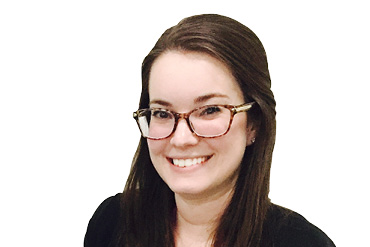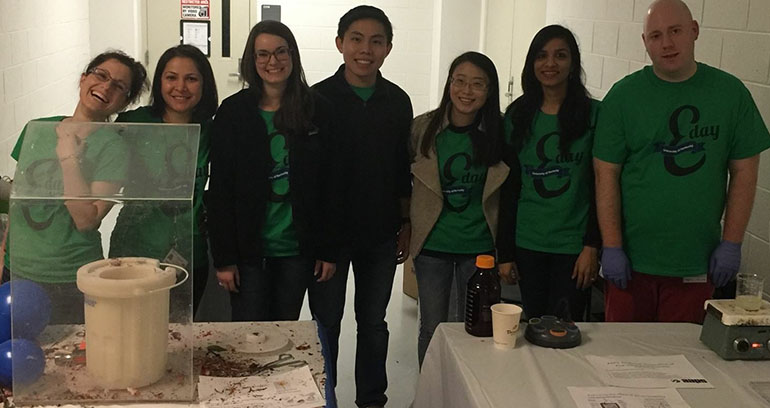Ph.D. candidate Ashley Lay looks forward to a career in drug development and formulation.
By Mark Crawford

When Ashley Lay was earning her undergraduate degree in chemical engineering at the
University of Kentucky (UK), she discovered she was most interested in the applications of chemistry in pharmaceutical research and development. “Taking classes at the College of Pharmacy during my undergrad career really cemented my desire to move into the pharmaceutical sciences,” says Lay.
Today she is a fourth-year doctoral candidate in pharmaceutical sciences at UK’s College of Pharmacy working for Eric Munson, Ph.D. Her thesis explores stability challenges in lyophilized (freeze-dried) protein formulations using solid-state nuclear magnetic resonance spectroscopy.
She is looking forward to publishing her first scientific paper related to her doctoral research. “I plan to focus on addressing the stability challenges of lyophilized formulations, especially protein formulations,” she adds. “I will discuss changes in solid-state acidity during the lyophilization cycle and the corresponding impact on drug stability, as well as the impact of miscibility between stabilizing sugar and protein on formulation stability.”
EAGER TO LEARN
In 2014 Lay joined the American Association of Pharmaceutical Scientists (AAPS). In 2017 she served as the Physical Pharmacy and Biopharmaceutics (PPB) section student representative and chair of the PPB section student committee at the national level, and as the UK student chapter chair at the local level. In 2016, as the PPB section student committee chair-elect, she helped organize outreach activities at both local and national levels.
Lay finds outreach with younger students to be especially rewarding.
“Attending science-related events or presentations at museums as a child got me interested in science as a career path,” she notes. “That’s why I feel it is important to reach out to K–12 students and introduce them to science in an engaging way.”
Last year Lay helped organize and present an introduction to pharmaceutical sciences for young students that included lab demonstrations. She also enjoyed serving as workshop leader for Girls in Engineering, Math, and Science (GEMS) events held at UK, as well as conducting pharmaceutical demonstrations during UK’s Engineering Day outreach event. “I love to see the students’ curiosity for science and the interesting viewpoints they have, based on the engaging questions they ask,” Lay says.
 Lay at UK's Engineering Day.
Lay at UK's Engineering Day.
GETTING INVOLVED
Lay also enjoys being involved in academic or professional communities. “It is a win/win from my standpoint,” she points out. “Hopefully my contributions are beneficial for others and help address unmet needs, and in return I can experience valuable networking and learning opportunities.”
Being active in scientific and networking groups has helped Lay strengthen her “soft skills,” such as presentation skills, adaptability, time management, delegation, teamwork, and communication. “I try to give as much time as I can to my professional associations, while still meeting my weekly and monthly research goals,” states Lay.
A summer internship in 2017 at Regeneron Pharmaceuticals was a valuable opportunity for Lay to learn about the pharma industry and be sure pharma was the exciting and rewarding career she hoped it would be. She learned more about the drug discovery and development pipeline and contributed to knowledge that may lead to approval of an antibody drug candidate, which was exciting and highly rewarding. She also learned that “bringing a drug to market is only possible through collaboration with an interdisciplinary team of scientists.”
Joining a professional association also helped Lay develop her leadership skills and be involved in larger groups and projects. “The more you take on, the more people you interact with,” she observes. For Lay, these skills include organization, punctuality, good communication, commitment, confidence, honesty, and motivating others. A piece of key advice: “Don’t strive for perfection,” she says. “Strive to work hard.”
She quickly learned in graduate school that perfection is impossible.
“You have to learn to balance school work, research, and your personal life,” she says. “I try to work hard for every research project and class that I have and give it my best effort. Although my best effort may not always be perfect, I do know that hard work will pay off. Research almost never goes as planned, so I’ve learned to be flexible and change my weekly and monthly goals based on whatever circumstances may arise.”
PREPARING FOR THE FUTURE
Lay recommends finding a mentor through academic relationships or professional associations such as AAPS. Lay was matched with a highly accomplished mentor in a similar research field—Allen Templeton, Ph.D., vice president of pharmaceutical sciences at Merck. “In our first year, we had about three teleconferences, where I prepared questions regarding choosing a career path,” says Lay. “Dr. Templeton also reviewed my résumé and gave me valuable pointers for strengthening it. We still keep in contact and catch up at AAPS meetings.”
Lay looks forward to being a mentor. “Now that I am a more senior lab member, I try to offer guidance to beginning grad students when needed,” she adds.
Her best advice for students is to join AAPS and engage with members. “AAPS provides students with so many opportunities, through its student chapters and at the national level,” Lay says.
She is grateful for the educational opportunities that AAPS has provided, including comoderating sessions at the 2016 and 2017 annual meetings, representing the PPB section, chairing its student committee, and finding a mentor. These experiences increased her confidence and improved her leadership and communication skills.
“Leading the PPB student committee required communicating with the group through email and leading teleconferences,” she notes. “Moderating sessions allowed me to communicate and present to a large audience of researchers. Being the chair of the UK AAPS chapter required me to coordinate efforts with other student officers and to learn how to delegate tasks.”
Finally, the most valuable AAPS benefit has been the networking opportunities.
“I have been able to make many valuable contacts at AAPS’ annual meetings,” Lay concludes. “These contacts have led to potential collaborations and productive scientific discussions. I look forward to giving back to AAPS in the same way as my professional career moves forward.”
Mark Crawford is a science and technology freelance writer based in Madison, Wis. (Mark.Crawford@charter.net).